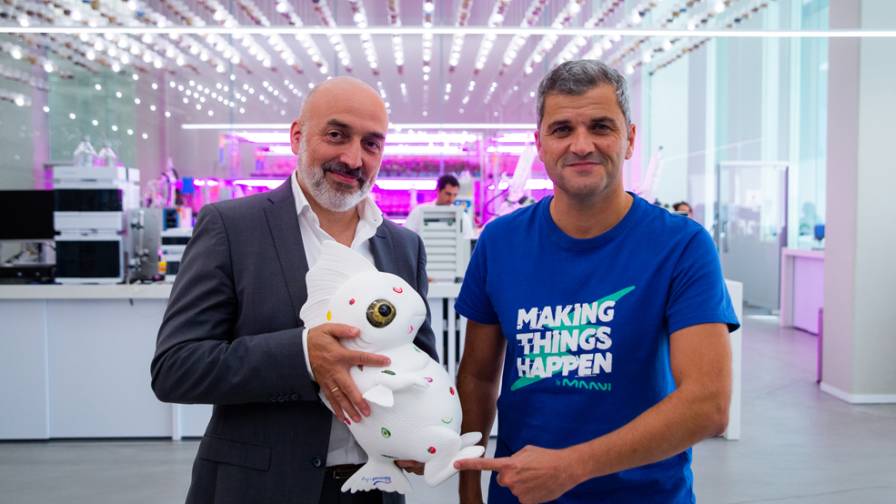Agroponiente Partners with Kimitec’s MAAVi to Accelerate Commitment to Zero Residue Production

Agroponiente CEO Imanol Almudi (holding Kimitec Mascot Marcelino) and MAAVi Kimitec CEO Félix García.
Agroponiente and Kimitec’s MAAVi Innovation Center have recently signed a MAAVi Lab, a strategic collaboration agreement aimed at accelerating Agroponiente’s transition towards zero residue production.
“If we intend to become a market leader, we need to be at the head of zero residue production, and Kimitec is the right partner to help us boost our transition towards real sustainability,” explained Agroponiente’s CEO, Imanol Almudí, during the MAAVi Lab signing event. “Sustainability is the pillar on which we are building the future of Agroponiente, and that is why our current business strategy focuses on the elimination of pesticides and other chemicals from our production processes.”
To achieve that, Kimitec’s MAAVi Innovation Center will analyze the agronomic needs of Agroponiente, to develop natural products for pest and disease control that can replace conventional chemical alternatives, while maintaining or even increasing their efficacy and productivity levels but excluding any kind of environmental impact.
“Our goal is to walk hand-in-hand with Agroponiente throughout their transition towards a residue-free food production system over the next few years,” points out Félix García, Kimitec’s CEO. Thus, this new MAAVi Lab will accelerate Agroponiente’s corporate environmental policy, which has already allowed the company to reduce their carbon footprint by over 45% over the last year and ensure their compliance with several #SDGs included in the United Nations Global Compact, such as sustainable productions systems, efficient use of water resources, reduction of food waste, and proper recycling management.
Furthermore, Agroponiente’s MAAVi Lab will also aim to increase productivity, improve the organoleptic properties, and the postharvest shelf life of fruits and vegetables, and reduce the environmental impact of the company.
As a result of the latest European and global strategies and policies restricting the use of chemical-based products in agriculture, the search for natural solutions as effective and cost-efficient as synthetic chemicals has become a priority for numerous companies that need to maintain crop productivity and profitability.
This shift in the food production system, making it healthier, more sustainable and fully aligned with the goals established in the European Green Deal and its Farm to Fork strategy, must necessarily be accompanied by new tools for growers and producers that help them through this new legal scenario, without impacting their economic profitability.
Producers are starting to wonder: Who will look for an answer to their problems? Who will support them in finding the solutions they need? Who can they turn to? That is why the MAAVi Innovation Center created the MAAVi Labs, agreements through which they make their R&D&I capabilities available to all producers, big and small, to help them find real solutions to recurrent agronomic problems, building upon Kimitec’s 15 years of experience in researching natural compounds and the potential offered by the largest biotechnology center in Europe. These strategic alliances are based on an active listening approach and a profound understanding of the challenges faced, and finalize with the development of a product, contrarily to what other research centers offer.
The ban on certain active ingredients as a result of Europe’s Farm to Fork strategy makes production considerably more difficult. “The market is changing. Sustainability is no longer negotiable, but a must we gladly accept with the determination to completely revolutionize the industry,” says Almudí.
“In the agricultural industry, producers are taking two different positions: There are those who actively look for solutions, and those who just wait to react once they have been found,” García adds
Almería and Spain need to take a leap forward, refrain from selling no matter the cost, and build on differential values that will allow them to achieve a higher profitability, such as natural production, sustainability, quality and a longer post-harvest life, explains García. “R&D will be a valuable tool, but there will be others, such as the digitization of agricultural practices and the use of drones,” he says.
What is a MAAVi Lab?
“These agreements are aimed at large producers who anticipate the imminent change in the agricultural sector and want to be the first to reach zero residue while sustaining or increasing their productivity,” explains García.
“A MAAVi Lab is our way to focus on a specific problem in the fields of agriculture, livestock, aquaculture, agro-industry, cosmetics, etc., and establish a collaboration for the development of innovative, sustainable solutions,” he adds. “Aiming to reduce losses, increase production, put our expertise in biotechnology and all the resources available at our research center at the service of the market, achieve zero residues and sustainability in industrial processes, and find natural molecules capable of replacing chemical substances, these strategic projects are led by the MAAVi and targeted at any company committed to change.”






